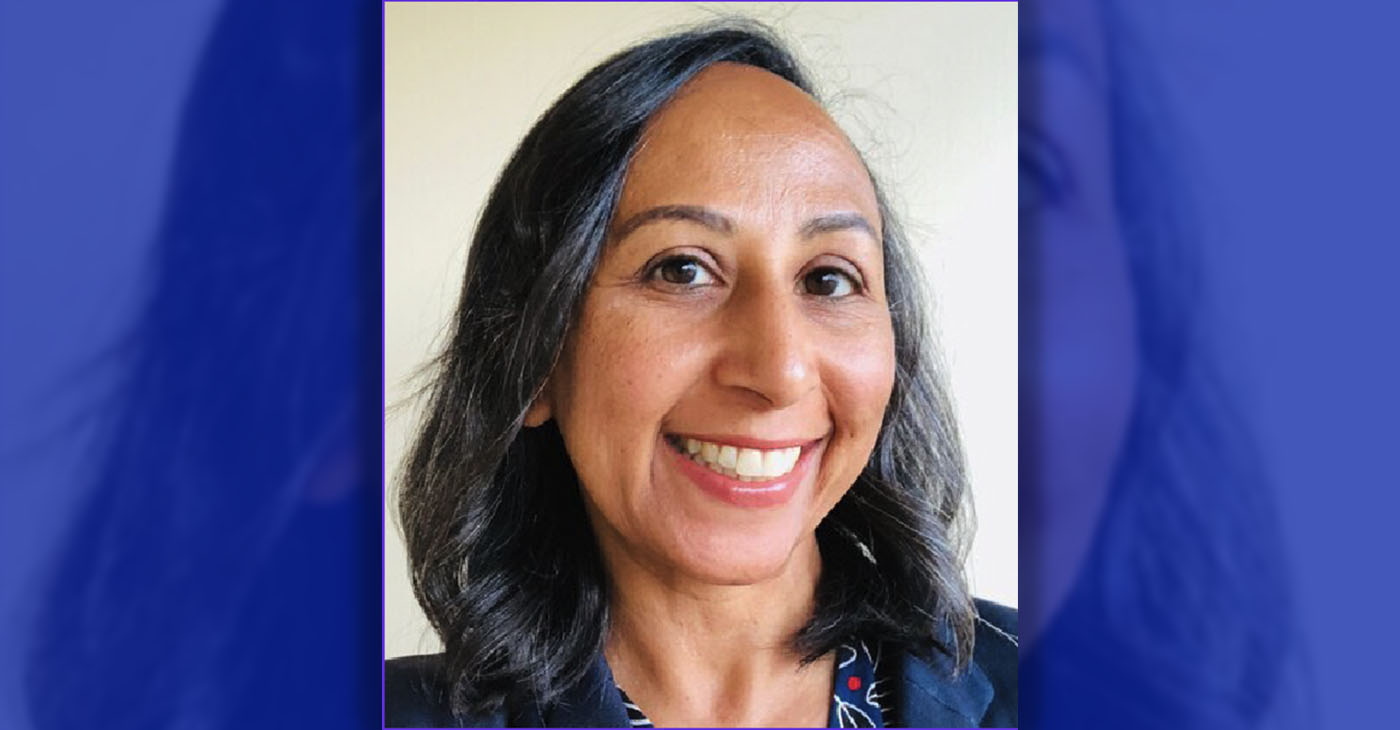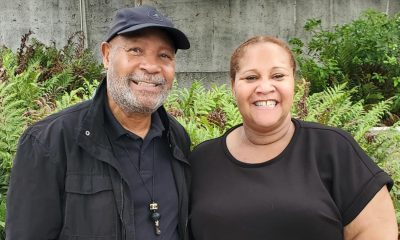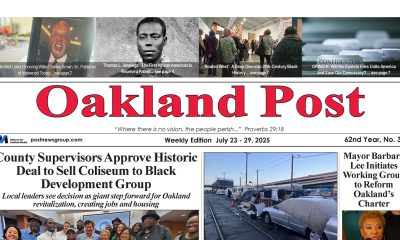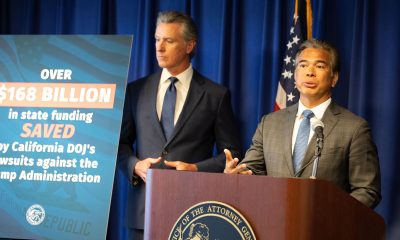California Black Media
COMMENTARY: Finding Joy and Justice for Childbearing Black Moms
Black mothers are more likely to die due to complications from pregnancy and childbirth than pregnant women of all other races. This is a shameful injustice plaguing the Black community, one that is over 400 years in the making.

By Dr. Melissa Franklin, Special to California Black Media Partners
Black mothers are more likely to die due to complications from pregnancy and childbirth than pregnant women of all other races. This is a shameful injustice plaguing the Black community, one that is over 400 years in the making.
Black women are 1.6 times more likely to experience more maternal mental health conditions, including prenatal and postpartum anxiety and depression, than women of other races, according to the American Hospital Association Institute for Diversity and Health Equity.
These injustices are killing Black women who are well-resourced and educated like Olympian Tori Bowie, as well as those enduring economic hardship. It is also harming their babies. And although this crisis has attracted national attention, it remains unaddressed.
For Black women, like me, who have experienced premature childbirth, the trauma and guilt of not being able to bring our babies full term can be long-lasting. Those psychological scars exist along with the other physical and mental threats to our health and wellbeing.
Both of my children were born three months early, despite my best efforts. I had a steady job, decent income, post-graduate education, a good bill of health and a stable relationship. Yet, my health and life were threatened in both of their births. One would think that such an experience would place me in a unique category. However, as a Black woman, it does not.
In Los Angeles County, Black women die at three to four times the rate of other races due to pregnancy-related complications, and Black babies die at two to three times the rate of any other race before their first birthday. Black babies are born premature at greater rates than any other ethnic group, which can lead to long-term health and developmental challenges. The Black community is also shouldering a disproportionate amount of the mental burden of tragedy and loss when it comes to pregnancy and childbirth.
To solve this problem, we must acknowledge three truths:
- The problem is not with Black people.
- It’s the system that is failing Black people.
- This problem is solvable, and Black people deserve to have joyous and healthy births.
The data coupled with our lived experiences and history as Black people tells us something is amiss. College educated Black women experience worse birth outcomes (i.e., death, premature birth, health complications for mother and child) than white women with high school diplomas. Black women who are non-smokers have worse birth outcomes than white women who smoke. The root problem is also not “teen pregnancy.”
Black teens have better birth outcomes than older Black individuals.
The root causes of the problem are complex. In short, stress kills.
The stress of generations of racial harm compounded by ongoing, exposure to racist treatment, prejudice and oppression, can be deadly. This stress is especially deadly when it is exacerbated by systems of care that disrespect and withhold quality care from Black people. The social contexts that imperil Black individuals to a greater extent than other races, such as homelessness, criminal justice injustice, education system injustice, and child welfare system injustice create a perfect storm for these root causes to grow.
There is hope for change. There are a number of initiatives underway to address the racism and stress that are at the root of the problem. These initiatives range from legislation such as the Federal Momnibus Act, California Senate Bill (SB) 65 (California Momnibus Act) and California SB 464 (Dignity in Pregnancy Act) to Statewide Initiatives such as the Perinatal Equity Initiative. In Los Angeles County, the Department of Public Health’s African American Infant and Maternal Mortality Initiative (AAIMM) brings together public agencies, community-based organizations, and advocates to raise awareness and transform how systems treat Black people.
But what can a Black woman/person do if they are pregnant or want to become pregnant one day? We can reclaim justice and joy by activating a village to address the stress. Until racism, racial microaggressions and poor treatment by the health care system are resolved, mental health support from multiple places is a powerful tool we can access.
This means building a village to provide social and emotional support, and as well as advocacy during your childbirth journey. Available resources include:
Black Infant Health Program — prenatal groups that bring together Black pregnant folks in a group setting. They offer support, resources, and a coach to help you through your journey.
Doulas — birth partners who provide emotional and physical support during pregnancy, childbirth, and the early postpartum period. Los Angeles County AAIMM Doula program provides doulas services by Black Doulas for Black families.
Group Prenatal — a small prenatal care group of pregnant women with similar due dates led by a clinician.
Home Visitation — assistance to expecting families on their journey through pregnancy and early parenting, delivered by a public health nurse or a parent coach.
Midwives, Maternity Homes and Birth Centers — Important sources of caring, quality support and advocacy.
While agencies and advocates are mounting efforts, we all have an important role. Even if you have no plans of becoming pregnant or parenting in the future, you can still make a difference when it comes to the mental health of childbearing moms.
If you know someone who is pregnant, connect them to a resource to assist them on their journeys. Be a friend and advocate. Take ACTION to show them they have a village —offer to cook/bring a meal, go with them to their appointments, provide a shoulder to lean on when they are exhausted.
While we work to make this world a less traumatizing place for Black people, we can also take steps to prevent the stress of that trauma from killing our mothers and our babies. We deserve to experience joy, abundance, and beautiful, healthy births. It is our birthright.
About the Author
Dr. Melissa Franklin is the Director of maternal, Child and Adolescent Health at the Los Angeles County Department of Public Health.
Related Video
Chelsea, an expectant mom, and Danica, her doula, discuss the delicate connection between mental health and maternal care. Watch the video.
Activism
Oakland Post: Week of August 20 – 26, 2025
The printed Weekly Edition of the Oakland Post: Week of August 20 – 26, 2025

To enlarge your view of this issue, use the slider, magnifying glass icon or full page icon in the lower right corner of the browser window.
Activism
Oakland Post: Week of August 13 – 19, 2025
The printed Weekly Edition of the Oakland Post: Week of August 13 – 19, 2025

To enlarge your view of this issue, use the slider, magnifying glass icon or full page icon in the lower right corner of the browser window.
Activism
Gov. Newsom: California Won’t Sit Idle While Texas “Games the System” in Redistricting Battle
The governor’s office confirmed that four legal and political options are under review, including a 2026 ballot measure that would dismantle the state’s independent redistricting commission and return the power to draw political maps to the Legislature. California voters created the commission in 2008 to insulate the process from partisan influence.

By Bo Tefu, California Black Media
Gov. Gavin Newsom says California won’t “sit idle” as Republican-led states like Texas manipulate congressional maps to entrench power — even if that means rethinking California’s own redistricting rules.
“We’re not going to play by a different set of rules anymore,” Newsom said last week, after Texas Republicans approved new congressional maps in a special session pushed by President Trump. He called the move a “five-alarm fire for democracy” and signaled that California may need to respond in kind to help Democrats reclaim control of the U.S. House.
The governor’s office confirmed that four legal and political options are under review, including a 2026 ballot measure that would dismantle the state’s independent redistricting commission and return the power to draw political maps to the Legislature. California voters created the commission in 2008 to insulate the process from partisan influence.
The idea, still in exploratory stages, has sparked sharp backlash from California Republicans, who accuse Newsom and state Democrats of trying to upend a fair system for political gain.
“We win elections by a war of ideas, not by manipulating the lines,” said Assembly Republican Leader Heath Flora (R-Ripon). “This could cost everyone a lot of money and destroy voter trust.”
Other GOP leaders warn the proposal could unravel nearly two decades of bipartisan reform and tarnish Democrats’ credibility on voting rights. They argue that responding to Texas by undermining California’s own democratic safeguards sends the wrong message.
Newsom, however, insists California can’t be passive while other states exploit partisan redistricting to tilt national power. He noted that the state’s independent system was created under different political conditions and may no longer serve California’s strategic interests.
“This could cost everyone a lot of money and destroy voter trust,” he said.
Still, critics from both parties remain skeptical that California voters — who overwhelmingly approved the redistricting commission — would back a return to lawmaker-controlled mapmaking. Newsom has not ruled out putting the issue before voters in 2026.
As of publishing time, the Texas Legislature had not officially approved the redrawn electoral maps, and Gov. Greg Abott had not signed them into law.
The redistricting debate comes at a critical moment, as both parties aim to lock down control of the U.S. House. Any changes to California’s maps could reshape the national political landscape for years to come.
-

 Alameda County2 weeks ago
Alameda County2 weeks agoMid-Year Data Shows Crime Is Declining in Oakland Across All Fronts
-

 Activism2 weeks ago
Activism2 weeks agoDerrick Muhammad Appointed to the Oakland Port Commission
-

 Activism2 weeks ago
Activism2 weeks ago‘I Was There Too’ Reveals the Hopes, Dangers of Growing Up in The Black Panther Party
-

 Activism4 weeks ago
Activism4 weeks agoOakland Post: Week of July 23 – 29, 2025
-

 #NNPA BlackPress2 weeks ago
#NNPA BlackPress2 weeks agoShedeur Sanders Shines in Preseason Debut
-

 Activism2 weeks ago
Activism2 weeks agoOPINION: With Texas Redistricting, Trump Is Rigging Our Democracy
-

 Alameda County2 weeks ago
Alameda County2 weeks agoMayor Barbara Lee Celebrates Successful National Night Out 2025 with Participation Across Oakland
-

 Activism2 weeks ago
Activism2 weeks agoGov. Newsom: California Won’t Sit Idle While Texas “Games the System” in Redistricting Battle


















































